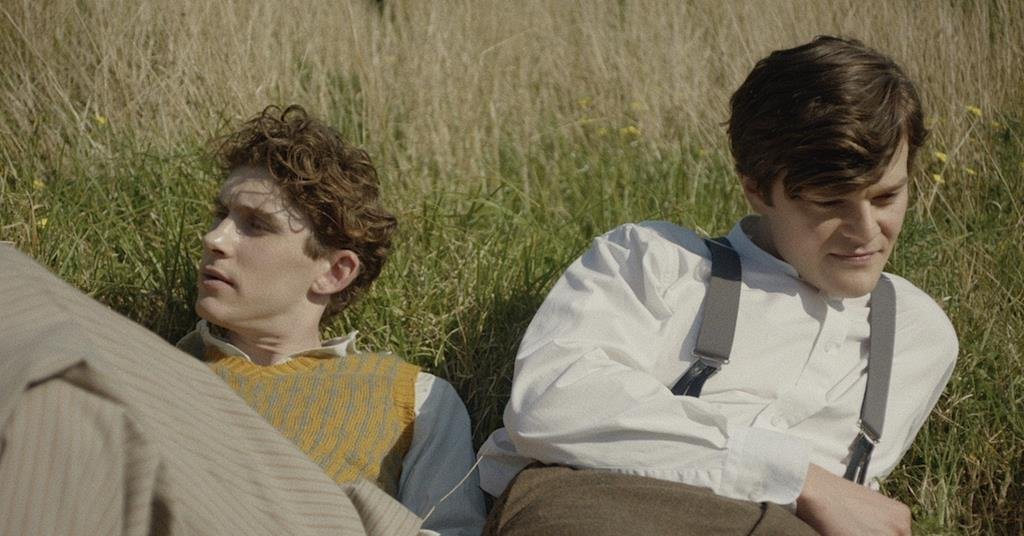Dir/scr. Will Seefried. South Africa/UK/US 2024. 97mins
Interval drama Lilies Not For Me pursues a severe function in exposing a horrifying, now largely forgotten facet of the historical past of homophobia. However debut writer-director Will Seefried – creator and co-star of Laura Linney miniseries Sink Sank Sunk – goes about exploring the theme in a bizarrely uneven manner, with mismatched registers leading to a discordant mixture of decorous heritage pic and borderline-Gothic melodrama. Strong performances maintain issues on an excellent keel, and the movie might have some restricted traction in LGBTQ+ channels following its Edinburgh premiere. However youthful viewers are prone to discover it previous hat and altogether coy – at the very least, when it’s not striving for incongruous shock impact.
An odd combination of coy delicacy and clunking overstatement
Set in England within the early Nineteen Twenties, the story focuses on Owen (Fionn O’Shea), a younger author struggling along with his second novel whereas resident as a affected person in a medical establishment the place he’s being handled to ‘treatment’ his homosexuality. In between injections that make him violently nauseous, he has follow teatime ‘dates’ with eager-to-help younger nurse Dorothy (Erin Kellyman) to prime him for heterosexual attraction.
Flashbacks cowl Owen’s earlier sojourn at a spartan cottage within the nation, the place he’s visited by previous good friend Philip (Robert Aramayo), a medic who has survived the horrors of the First World Conflict. On this balmy, paradisal milieu, the 2 males’s mutual attraction involves the fore – however Philip publicizes that their emotions are improper and have to be corrected. Earlier than that occurs, nevertheless, the boys agree to provide their wishes free rein, leading to an idyllic spell of erotic romance, captured in poetic close-ups of pores and skin on pores and skin.
Each males appear so content material with their interlude that it comes as a shock when Philip publicizes that it’s time to nip ardour within the bud, proposing a radically grisly medical technique – though the relative lack of blood concerned, and the surprisingly temporary and painless restoration time, stretch plausibility considerably, as does the cursory therapy of a hapless interloper who serves as unwitting donor.
Then one other customer drops in, Charles (German actor Louis Hoffman, convincing as a dashingly flirtatious Brit), seeking his lacking father. Regardless of the obvious urgency of the scenario, Charles decides to hold round for some time, to take a unadorned open-air scrub-down and to show Owen a dance referred to as the Grizzly Bear. Occasions take a extra intimate flip nonetheless – up a tree, suitably for this bucolic setting – triggered by Owen’s recitation of the verse by Nineteenth-century poet Digby Mackworth Dolben that offers the movie its title.
Startling shifts of tone outline this awkwardly conceived movie: it’s onerous to know the way dependable the agricultural flashbacks are, or whether or not they’re filtered by means of Owen’s novelistic creativeness, however they fail to gel convincingly. The nation sequences are introduced in a wistfully aestheticized manner that harks again to the ‘white linen’ heritage dramas related to Eighties Service provider-Ivory, and customarily to the gay-themed movies (Maurice, One other Nation) of the interval. In contrast, the hospital scenes evoke a chilly, prison-like enclosure, the place Owen is manhandled by a wrestler-like attendant.
However protruding like a sore thumb is the (traditionally actual) medical intervention espoused by Philip. We don’t see something graphic, however we’re definitely prone to wince – partly in discomfort, partly as a result of it includes so jarring a shift of tone. Then there’s the ultimate scene, the place director Seefried throws warning, and realism, to the wind in his imagery (together with a glimmer of the perennial homosexual iconography of Saint Sebastian).
The appearing at the very least gives credible ballast. Sport Of Thrones and The Rings Of Energy alumnus Aramayo is by turns bluff, tender and oddly menacing, whereas Kellyman, whose TV contains High Boy and Willow, provides Dorothy slightly extra edge than the gauche solicitousness that her position largely requires. O’Shea – greatest identified for Regular Folks and Masters of the Air (and, like Kellyman, a former Display Star of Tomorrow) – struggles bravely in opposition to the possibly insipid depiction of Owen, peppering it with rebellious irony within the hospital scenes. For a lot of the movie, nevertheless, the younger author is painted as a fragile, starry-eyed aesthete who clearly shouldn’t be hiding away within the nation when he could possibly be having fun with a a lot brisker time among the many literary ‘Misplaced Technology’ depicted in Terence Davies’s similarly-themed Benediction.
An general visible staidness is underlined by a palette that goes closely for stone and oatmeal for the nation passages, whereas occasional costume touches really feel oddly redolent much less of the 20s than of an England nonetheless deep within the Edwardian age. Closing titles lay out the horrifying historic info on which the drama is predicated. However director Seefried approaches this sexually benighted interval with an odd combination of coy delicacy and clunking overstatement. It’s shocking to discover a younger director making a movie this determinedly old school, except you learn the movie as a knowingly retro tribute to the bygone ‘love-that-dares-not-speak-its-name’ period of homosexual drama.
Manufacturing firms: Wolflight Movies, Paradise Metropolis
Worldwide gross sales: Memento Worldwide gross sales@memento-films.com
Producers: Hannes Otto, Roelof Storm, Will Seefried, Naïma Abed, Emilie Georges
Cinematography: Cory Fraiman-Lott
Editor: Julia Bloch
Manufacturing design: Birrie Le Roux
Music: Theodosia Roussos
Predominant forged: Fionn O’Shea, Robert Aramayo, Erin Kellyman, Louis Hoffman, Jodi Balfour
